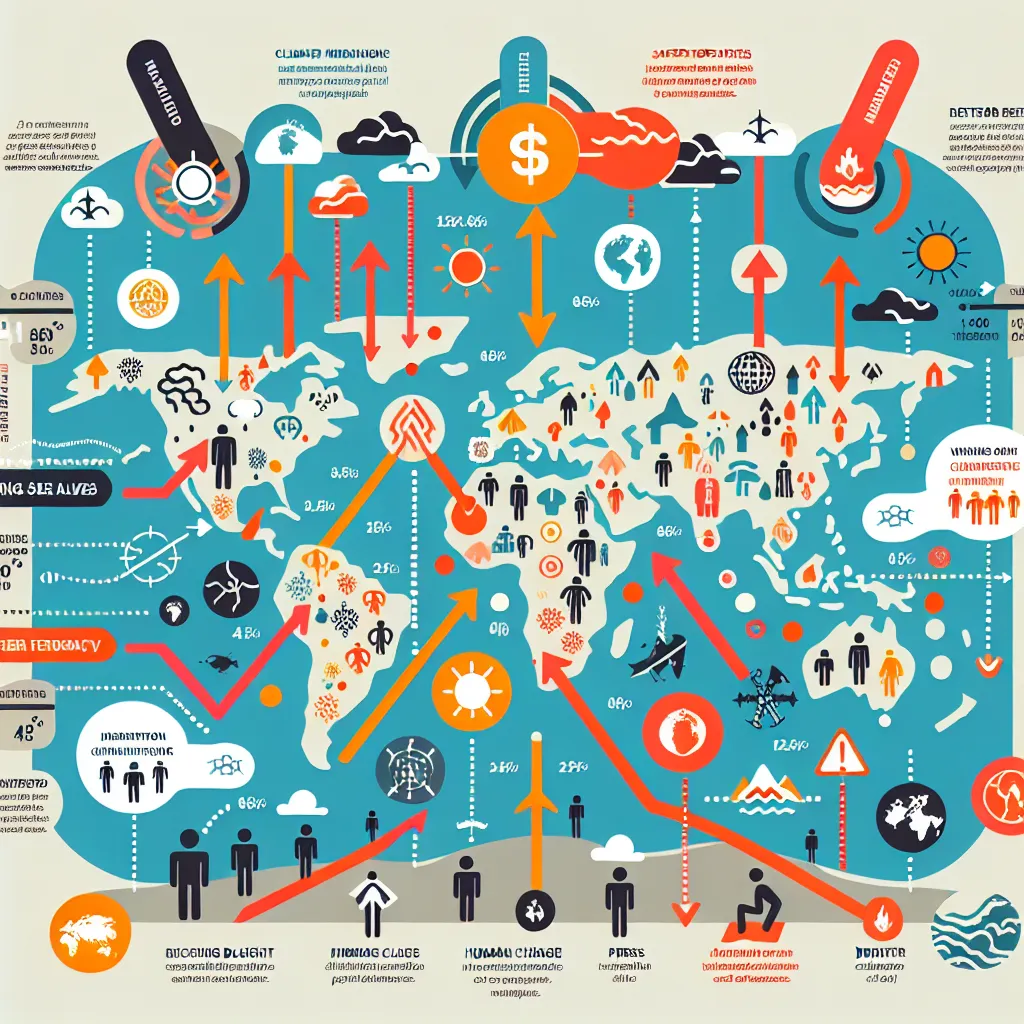Climate change and its impact on human migration patterns is an increasingly relevant topic in IELTS Writing Task 2 essays. This subject has appeared in various forms in recent years and is likely to continue being a significant theme in future exams. Let’s explore a sample question and learn how to craft a compelling essay on this crucial global issue.
 Climate Change Migration Infographic
Climate Change Migration Infographic
Analyzing the Task
Let’s consider the following IELTS Writing Task 2 question:
Climate change is causing people to migrate from rural areas to cities. What are the causes of this migration? What problems does it create?
This question focuses on two key aspects:
- The causes of climate-driven migration from rural areas to cities
- The problems created by this migration
To excel in this task, we need to address both parts of the question thoroughly while maintaining a clear structure and using appropriate vocabulary and grammar.
Sample Essay (Band 8-9)
Here’s a high-scoring sample essay that effectively addresses the question:
Climate change has become a significant driver of human migration in recent years, with many people moving from rural areas to urban centers. This essay will explore the causes behind this trend and discuss the challenges it presents.
There are several reasons why climate change is forcing rural populations to relocate to cities. Firstly, rising temperatures and changing precipitation patterns are making agriculture increasingly difficult in many regions. Farmers are struggling to maintain crop yields, leading to food insecurity and economic hardship. Secondly, extreme weather events such as floods, droughts, and storms are becoming more frequent and severe, destroying homes and livelihoods in rural areas. These disasters often leave people with no choice but to seek refuge in urban areas, where they hope to find better opportunities and more resilient infrastructure.
The influx of climate migrants to cities creates numerous problems for both the newcomers and the existing urban population. One major issue is the strain on urban resources and infrastructure. Cities may struggle to provide adequate housing, healthcare, and education for the growing population, leading to overcrowding and the expansion of informal settlements. Additionally, the sudden increase in population can exacerbate social tensions, as competition for jobs and resources intensifies. This can lead to social unrest and potentially increase crime rates. Furthermore, the loss of rural populations can have negative impacts on food production and cultural heritage, as traditional farming practices and rural ways of life are abandoned.
In conclusion, climate change-induced migration from rural to urban areas is driven by agricultural challenges and increasing natural disasters. This movement creates significant problems for cities, including resource shortages, social tensions, and the loss of rural traditions. Addressing these issues will require coordinated efforts from governments, urban planners, and international organizations to develop sustainable solutions that benefit both rural and urban populations.
[Word count: 298]
Sample Essay (Band 6-7)
Here’s a sample essay that would typically score in the Band 6-7 range:
Climate change is making many people move from the countryside to cities. This essay will look at why this is happening and what problems it causes.
There are two main reasons why climate change makes people leave rural areas. First, it’s getting harder to grow food because the weather is changing. Farmers can’t grow as much as before, so they don’t have enough money. Second, there are more natural disasters like floods and storms. These disasters destroy homes and farms, so people have to find new places to live. They often choose to go to cities because they think there will be more jobs and better protection from disasters.
When lots of people move to cities, it causes several problems. One big issue is that cities become too crowded. There might not be enough houses, hospitals, or schools for everyone. This can make living conditions bad for both the new people and those who were already in the city. Another problem is that it can be hard for newcomers to find jobs, which can lead to poverty and maybe even crime. Also, when people leave rural areas, it means there are fewer people to grow food, which could lead to food shortages.
In conclusion, climate change is forcing people to move to cities because of farming problems and natural disasters. This movement creates issues like overcrowding and job shortages in cities. Governments need to find ways to help both rural and urban areas deal with these challenges.
[Word count: 249]
Key Points to Remember When Writing
-
Address all parts of the question: Ensure you discuss both the causes of migration and the resulting problems.
-
Use appropriate structure: Include a clear introduction, body paragraphs (each focusing on a main idea), and a conclusion.
-
Provide specific examples: Support your arguments with relevant examples or explanations.
-
Use a range of vocabulary: Incorporate topic-specific vocabulary and avoid repetition.
-
Employ varied sentence structures: Mix simple, compound, and complex sentences for a more sophisticated writing style.
-
Use appropriate linking words: Connect ideas smoothly within and between paragraphs.
-
Maintain a formal tone: Avoid colloquial expressions and overly emotional language.
Essential Vocabulary for Climate Change and Migration Essays
Here are some key terms to remember when writing about climate change and migration:
- climate refugee (noun) /ˈklaɪmət ˌrefjuˈdʒiː/ – a person forced to leave their home due to climate change impacts
- environmental degradation (noun) /ɪnˌvaɪrənˈmentl ˌdeɡrəˈdeɪʃn/ – the deterioration of the environment through depletion of resources
- urbanization (noun) /ˌɜːbənaɪˈzeɪʃn/ – the process of making an area more urban
- food insecurity (noun) /fuːd ˌɪnsɪˈkjʊərəti/ – lack of reliable access to sufficient quantity of affordable, nutritious food
- resilient infrastructure (noun) /rɪˈzɪliənt ˈɪnfrəstrʌktʃə/ – infrastructure capable of withstanding or recovering quickly from difficult conditions
- adaptation strategies (noun) /ædæpˈteɪʃn ˈstrætədʒiz/ – plans or actions to adjust to new conditions
- resource scarcity (noun) /rɪˈsɔːs ˈskeəsəti/ – a lack of sufficient resources
- sustainable development (noun) /səˈsteɪnəbl dɪˈveləpmənt/ – development that meets present needs without compromising future generations
By incorporating these terms naturally into your essay, you can demonstrate a strong grasp of the topic and improve your vocabulary score.
Conclusion
Writing about how climate change drives migration requires a good understanding of both environmental issues and social dynamics. Practice writing essays on this topic, focusing on structure, vocabulary, and addressing all aspects of the question. Remember to support your arguments with specific examples and use a range of grammatical structures.
For further practice, consider writing essays on related topics such as:
- The role of government in addressing climate-induced migration
- The impact of climate change on global food security
- Strategies for making cities more resilient to climate change and population growth
We encourage you to write your own essay based on the question provided in this article and share it in the comments section below. This is an excellent way to practice and potentially receive feedback from others studying for the IELTS exam.
To deepen your understanding of related topics, you might find these articles helpful:
- Climate Change’s Influence on Migration to Urban Areas
- How is Climate Change Affecting Global Health Initiatives?
- How is Climate Change Influencing Migration Patterns?
Remember, consistent practice and exposure to a variety of related topics will help you become more confident and proficient in tackling IELTS Writing Task 2 essays on climate change and migration.


